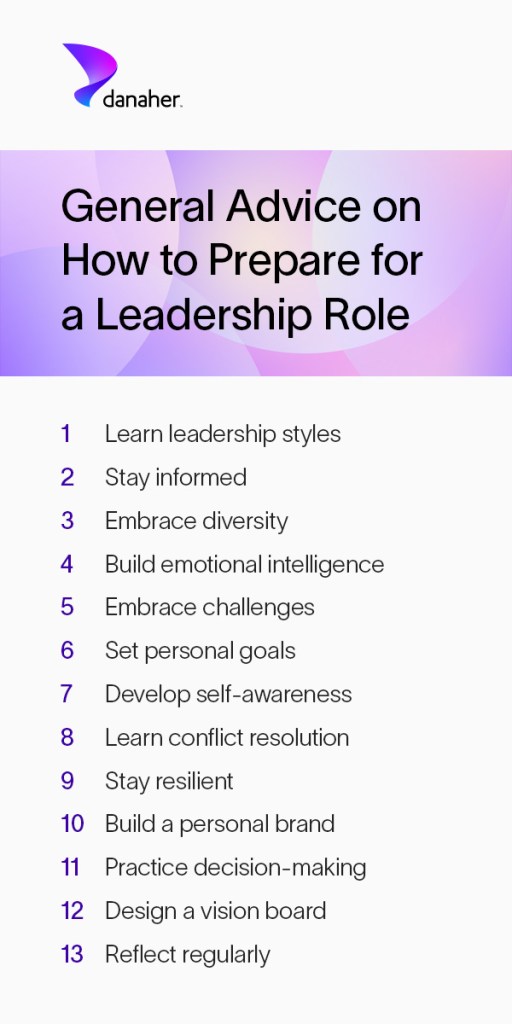The management field has a bright future, which should instill confidence in students looking to make a difference in this career. According to the U.S. Bureau of Labor Statistics, management occupations may see an average of 1.1 million job openings yearly between 2022 and 2032, making this profession one of the fastest-growing.
Regardless of one’s industry preference, there will likely be a management role. Although the path to a management position varies depending on the industry, many require a specific set of skills.
The highly competitive graduate job market can make the journey to a managerial position challenging. However, adequate preparation will help high school and college students stand out from the crowd and establish themselves as superb potential leaders. Here’s how to prepare for a career in management.
Table of Contents
- Skills to Develop
- 12 Tips to Prepare for a Career in Business Management
- Types of Management Roles to Consider
- General Advice on How to Prepare for a Leadership Role
- Build a Career in Management at Danaher
Skills to Develop
Considering a career in management early allows individuals to kick-start their journeys. Developing student leadership skills can help applicants stand out once they enter the job market. Here’s how to improve leadership skills as a student.
Accountability
Managers lead a team, and with a team comes accountability. Honing accountability skills will build a solid foundation for taking responsibility for one’s actions and outcomes. Students who build this foundation early will become shining examples for their peers, and the same will be true once they achieve a managerial position.
An accountability culture will challenge them to model the behavior they expect from their teams. This culture may foster more cohesive teams and decisive leadership by promoting a culture of trust and transparency — two vital components of leadership and team dynamics.
Adaptability
The world of business always changes, and when the time comes for change, people will look to their managers or leaders. Adapting to big changes, like the emergence of artificial intelligence, and small changes, like adjusting work processes, are equally vital. If students can learn to embrace change, they will become highly sought-after candidates in the job market.
Adaptability skills involve being open to change, learning new things and taking on challenges. Leaders with these skills can navigate uncertainty and lead their teams with confidence. Additionally, no obstacle or setback will seem too large with a flexible and resilient mindset.

Communication
The digital landscape of today has opened new channels that leaders must become familiar with. Communication can take various forms, such as verbal, text and video — even body language. Regardless of the format, people in manager positions must master the art of communication in all its states.
Many leadership roles demand communication skills — and for a good reason. Leadership roles often require one to listen and talk with team members, colleagues, clients and partners. Effectively communicating allows everyone to convey their thoughts, opinions and ideas effectively — all to benefit the company.
Decision-Making
Those in leadership roles often have the power to make decisions that affect many stakeholders. Those who improve their decision-making skills will also improve their ability to identify problems, analyze options and select the best course of action.
Making decisions can have a direct impact on a business’s performance and success. Although some decisions may be small, managers know that they can transform into large results.
Delegating
Managers typically oversee large teams that tackle many objectives. The manager’s role will most likely involve delegating responsibilities to the most appropriate team members. Delegating helps the entire team — and business — save time, money and resources.

Goal Setting
Managers will always need to set goals, including adhering to project deadlines or defining a personal strategy. Goals help leaders and their teams guide and track their progress. Having clear goals will help all stakeholders determine the actions and behaviors needed to achieve a single goal. It transfers effort into motivation, helping with a team’s performance and productivity.
Goal setting also has an impact on time management — another crucial leadership skill.
Mentoring
People in leadership or managerial roles may also need to mentor other team members who look up to them. Leaders in the workplace can mentor their colleagues by sharing their knowledge and experience to support an individual’s performance and development. It’s all part of building relationships and a stronger team.
Mentoring requires one to also know how to question, listen, clarify and communicate effectively.
Networking
Students can start building professional relationships early by connecting with peers, teachers or professors, friends and family, recruiters, and members of specific industry associations.
Growing a network opens new opportunities. For example, building professional relationships will help one gain assistance in a time of need for a new venture, project or career opportunity. A rise in one’s professional profile and brand will also help with visibility and getting noticed.
Problem-Solving

A creative mind and strategic thinking will take anyone in a leadership role far. Managers who can overcome challenges with strategic decision-making and problem-solving can help improve their and their team’s efficiency.
Many employees seek a leader’s advice or guidance for work-related issues. Leaders can help their teams by guiding them toward their goals and eliminating confusion, frustration and misunderstandings.
Time Management
Leadership responsibilities often come with rapid turnaround times. Knowing how to plan, prioritize and perform tasks within a specific period becomes crucial. Proper time management helps managers and teams hone their focus on a specific project and improve productivity and resource allocation.
12 Tips to Prepare for a Career in Business Management
In addition to learning skills that can help them in a leadership position, aspiring managers can take additional proactive steps. Let’s discuss a few tips that may better one’s odds of achieving their dream role.
1. Complete Internships or Volunteer
It’s one thing to learn leadership skills through text and theory, but it’s another to gain real-world experience. Whether students are nearing or upon graduation, they can consider participating in an industry-specific internship or volunteer program.
The firsthand experience can give a glimpse into what it can be like to manage a team. These programs can help applicants gain real-life experience and confidence. Plus, adding this experience to one’s resume can help aspiring managers stand out and get noticed.
2. Connect on Social Media
Students and aspiring managers can connect with professional influencers, companies and peers on social media platforms like LinkedIn. They can start building relationships outside their direct circle to expand their network. Additionally, growing a professional brand online can help with one’s image and noticeability.
To start a conversation, students can share industry-specific thoughts, ideas and interesting articles. They should remember to engage with people they would like to connect with and build a relationship with.

3. Complete Online Courses
Although it may require time and dedication, completing relevant online courses during one’s studies can provide a basic understanding of certain leadership skills. Many budget-friendly or free online courses address growth areas. Course topics could include people management, time management or effective communication.
4. Design a Professional Development Plan
A professional development plan can be implemented with or without a mentor. It’s a valuable document that establishes one’s career development goals and strategies for meeting them. In this plan, one can lay out individual-specific focus areas, objectives and plans to help them achieve a goal.
5. Find Part-Time Work
Students who have the time and energy can consider finding a part-time job that requires management or leadership skills. They can choose to manage hospitality staff, a bar, retail workers or admin teams. Even if the work does not relate to the industry of interest, gaining firsthand experience in a supervisory role is valuable.
Moreover, working a part-time job while studying can teach crucial skills, such as time management, communication and work-life balance. These valuable skills look great to employers.
6. Improve Skills
The most dedicated individuals know that there’s always room to improve. While developing certain leadership skills, always aim to improve them. Enhancing their skills can help students expand their professional competency and work performance. To do so, aspiring managerial innovators should consider gaining firsthand experience where they can put theory into practice. Otherwise, they can opt to complete an online course or attend a seminar for skill refinement.

7. Join Student Societies
Aspiring managers can choose to join student societies, such as signing up to chair a school club or pushing to become the captain of a sports team. They can also start a new club relevant to their area of interest. Although not the same as an internship, joining a club or society where a student can pursue a leadership role can build a basic foundation that will help them in future career opportunities.
8. Network, Network, Network
Put networking skills to the test. First, connect with industry leaders and those admired for their leadership skills, whether in-person or online. Find a way to build authentic business relationships with people who can have something to teach.
As a student, each connection counts. Strike up a conversation with a professor or other students, or attend lectures by former students. These connections can help one gain access to alums or a company that can offer a golden opportunity.
9. Seek a Mentor or Role Model
Consider someone knowledgeable and experienced, such as a professor, academic advisor, family member, friend or someone from a previous workplace. Connect with this person and ask if they could act as a mentor, giving guidance, advice and feedback.
A mentor could even be someone outside an inner circle, like a reputable influencer in the field. Students can aim to connect with these individuals on social media.
10. Study a Relevant Degree
One sure and quick way to prepare for a career in management involves completing a relevant degree. Students can opt to complete a degree in business management, for example. Various institutions offer this degree, and it’s up to the prospective student to do their research.
Management programs will differ depending on the school, but most follow a basic framework. This degree typically equips students with knowledge of various business aspects, such as operations, marketing, finance, human resources and project management.

11. Take Initiative
A key trait of someone in a leadership position is initiative. Cultivate a mindset of assuming responsibility and direction where appropriate. For example, in group projects, students can take the opportunity to practice their leadership and management skills by volunteering to take the lead and take responsibility for the team.
12. Utilize Career Support Services
Some schools or universities offer career support services — use them! These valuable assets help students develop and improve certain skills. These services may also help identify areas of interest and growth to improve students’ abilities. Career support services can even help connect students to potential employers.
The services offered depend on the institution. However, all have an overarching goal of making students’ career journeys as smooth as possible.
Types of Management Roles to Consider
The career opportunities in business management span dozens of industries. For students, it’s crucial to understand that there are different types of management under this umbrella — let’s discuss a few.
Top-Level Management
When people think of management, they generally think of positions such as CEO, COO, CFO or President. These top-level managers are responsible for setting an organization’s overall direction, establishing long-term goals and making high-level decisions. They represent the business to stakeholders.

Middle Management
Positions in middle management include department managers, regional managers or division heads. People in these roles implement policies and strategies set by top-level management. They also oversee departmental operations, manage teams and mediate between upper management and lower-level staff.
First-Line Management
Team leaders, supervisors and shift managers are all examples of first-line management. They directly manage their teams, oversee a business’s daily operations, provide training and support to teams, and ensure the team meets performance standards.
Project Management
Other leadership roles include project and program managers. Individuals in these positions carry many responsibilities associated with a project. They plan, execute and close projects according to deadlines and budgets. They coordinate resources, manage stakeholder expectations and ensure project goals align with organizational objectives.
Operations Management
Operations managers, or supply chain managers, oversee processes and delivery systems to ensure optimal performance. These individuals also analyze workflows and implement improvements to optimize operations.
Strategic Management
Those interested in becoming strategic planners or analysts can consider specializing in strategic management. These roles analyze market trends and internal capabilities to formulate long-term strategies that guide the organization’s direction.
Human Resources Management
Human resources managers and talent acquisition managers work to create a positive workplace culture and develop talent within the organization. They manage recruitment, training, employee relations, performance management and labor law compliance.
The list could expand into more detailed categories, such as financial, marketing, sales, IT and customer service. We recommend that students do more research on the management roles available in their industry of interest.
General Advice on How to Prepare for a Leadership Role

During one’s journey to becoming a leader and pursuing a career in management, keep these final tips in mind:
- Learn leadership styles: Students and aspiring leaders must understand the different types of leadership styles and their pros and cons. They should find one that resonates — be it the coaching or pacesetting style — by reading books, watching videos and observing other leaders.
- Stay informed: The business world constantly changes with new industry trends and events. Successful leaders stay updated so they can respond and adapt accordingly. Students should be sure to read authoritative articles, listen to podcasts and watch webinars discussing these changes.
- Build emotional intelligence: As we have learned, being a leader requires working with others in one way or another. Building emotional intelligence can help one practice empathy and self-regulation — two important traits of leaders.
- Embrace challenges: Students should become comfortable taking the initiative and tackling challenges head-on. The best leaders see setbacks and failures as learning experiences.
- Set personal goals: Aspiring leaders should start defining their leadership vision and set specific goals to achieve this vision. To accomplish this goal, they should track and assess their progress.
- Develop self-awareness: Individuals who want to become leaders in their careers must improve their self-awareness to grow personally and professionally. They must reflect on their strengths and weaknesses to identify areas of improvement. Also, seeking feedback from others may provide valuable insights into oneself.
- Learn conflict resolution: Working with various personalities in a team may stir up conflict from time to time. Learning conflict management techniques allows individuals to prepare themselves when a disagreement arises.
- Stay resilient: Managing various aspects of a business, department or team can be challenging. As they prepare for a future career, students should take the time to build effective stress-coping strategies. Cultivate optimism and a growth mindset that embraces challenges as opportunities for learning.
- Build a personal brand: Companies typically have an online presence, and so should potential employees. Building a personal brand can help applicants stand out from the crowd and build credibility. Individuals should define their values and share their insights on platforms.
- Practice decision-making: One crucial skill students can learn before graduation involves practicing decision-making under pressure. Doing so through real-life situations or role-playing exercises can help engage the mind and help one become more comfortable.
- Design a vision board: A vision board filled with images and words that evoke the leadership style one strives for can serve as a constant reminder of the end goal.
- Reflect regularly: Aspiring managers can make a journal and jot down any notes where they can reflect on experiences, challenges and growth as a leader. After a period of time, they can review the journal entries to identify patterns and areas for improvement.
Build a Career in Management at Danaher
We hope you now have a solid idea of how to start a career in business management before entering the job market! If you’re a student committed to leadership, we want to get to know you. Get ready to work hard, take risks and grow with other talented peers and leaders.
When you join the team at Danaher, you’ll meet supportive colleagues, discover new strengths and build skills necessary for a fulfilling career. Whatever your aspirations, we can help you achieve them.
Take the first steps toward a career in management at Danaher. Search for our available jobs or join our talent community today. Embrace the leader within yourself — together, let’s drive innovation that improves lives.


Comments
One response to “How to Prepare for a Career in Management”
[…] vision board can be an invaluable tool for self-directed career advancement. As a constant reminder of your goals, it should be something you revisit and interact with regularly. One of the best ways to use it is […]